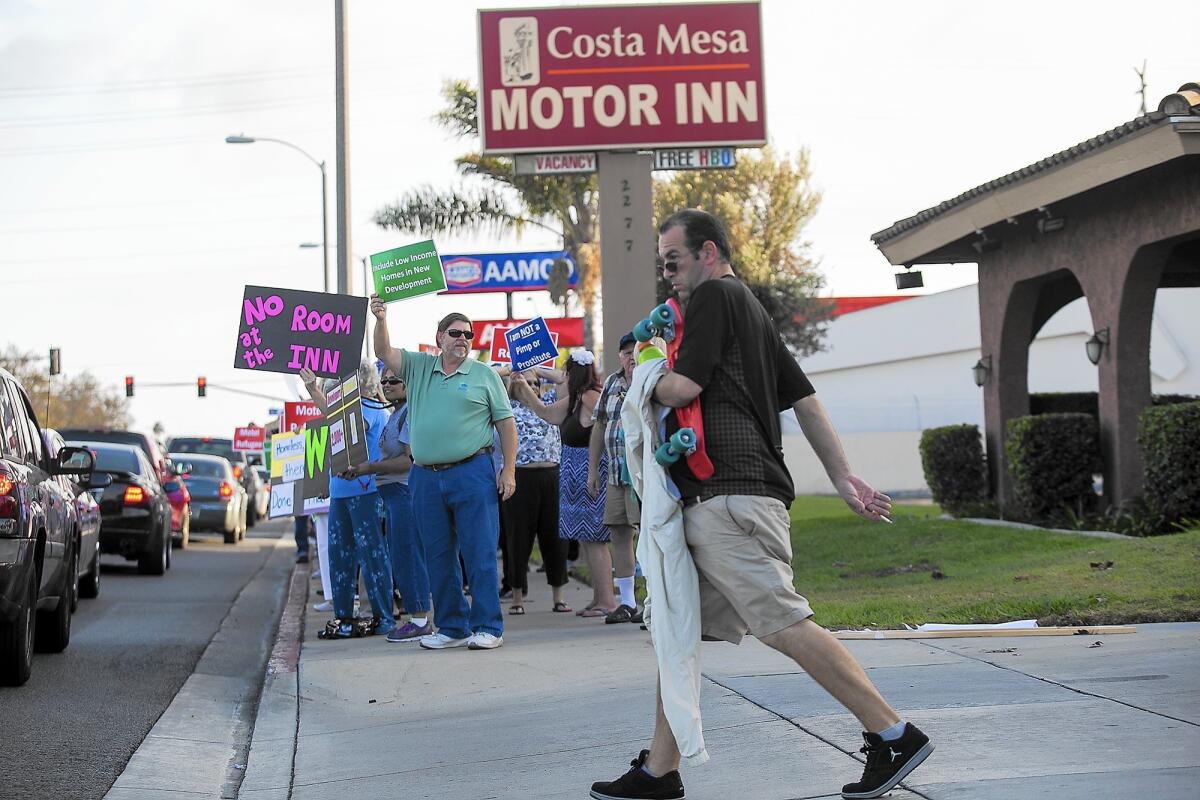Low-cost housing within new projects urged for Costa Mesa

Affordable-housing advocates had urged Costa Mesa officials to incorporate new low-cost units into a proposed incentive program. The Costa Mesa Motor Inn, pictured in October during a protest by affordable-housing advocates, was one of the properties targeted under the program. Council members declined to move ahead with such a program during their meeting Tuesday night.
- Share via
Affordable-housing advocates are urging Costa Mesa officials to incorporate new low-cost units within housing projects for Harbor and Newport boulevards created under a proposed incentive program.
The city program, officially called a “residential incentive overlay,” received tentative City Council approval last year and would give “opportunities” to owners of certain properties — particularly motels — along the two thoroughfares to rezone their land from commercial to high-density residential, with up to 40 units per acre.
The overlay is included in Costa Mesa’s general plan, a state-mandated city planning document that’s scheduled to receive council approval later this year.
The program targets Costa Mesa’s so-called problem motels — including the Costa Mesa Motor Inn, Sandpiper Motel and Vagabond Inn — that city officials have derided as blight and hotbeds for crime, human trafficking, prostitution and drug use. City officials hope that the 40-unit density bonus would give enough financial incentive for motel owners to pursue other housing proposals for their land instead of continuing to run a commercial motel.
A handful of speakers Monday who addressed the Planning Commission, which was hosting a hearing on the general plan, said getting rid of the motels would mean losing a source of de-facto affordable housing in the city.
“The city is trying to incentivize the motel owners to change the use of their properties to high-density, market-rate apartments,” said Kathy Esfahani of the Costa Mesa Affordable Housing Coalition. “The result of that will be a massive displacement of the current motel residents who will not be able to afford market-rate apartments.”
Esfahani said the city should require that affordable units be built within new projects utilizing the overlay incentive.
Mayor Pro Tem Jim Righeimer — who called the motel crime “one of the biggest issues we have” — said requiring affordable housing would defeat the purpose of the program altogether.
“Nothing’s going to happen if you require affordable housing. Period,” he said Wednesday.
Righeimer said providing affordable housing and getting rid of “problem properties” are separate issues.
He has proposed putting a $20-million bond on the November ballot that could help pay for new low-income units in the city. The council is expected to examine the idea later this year.
The Kennedy Commission, an affordable-housing advocacy group, sued the city earlier this year over the density bonus provided to the Costa Mesa Motor Inn’s owner, which has been approved to demolish the Harbor Boulevard motel and replace it with 224-high end apartments.
The suit, which was also filed against the Motor Inn’s owner, Miracle Mile Properties, alleges that the project violates state law because it didn’t set aside any low-income units.
Because of the lawsuit and other legal challenges, the Motor Inn project is on hold.
The Planning Commission, which did not take action on the proposed general plan update Monday, will reexamine it April 11.
